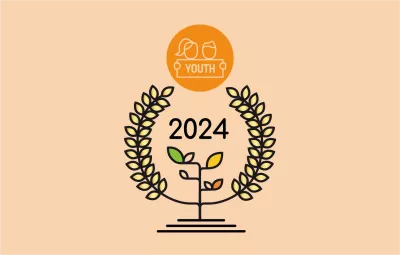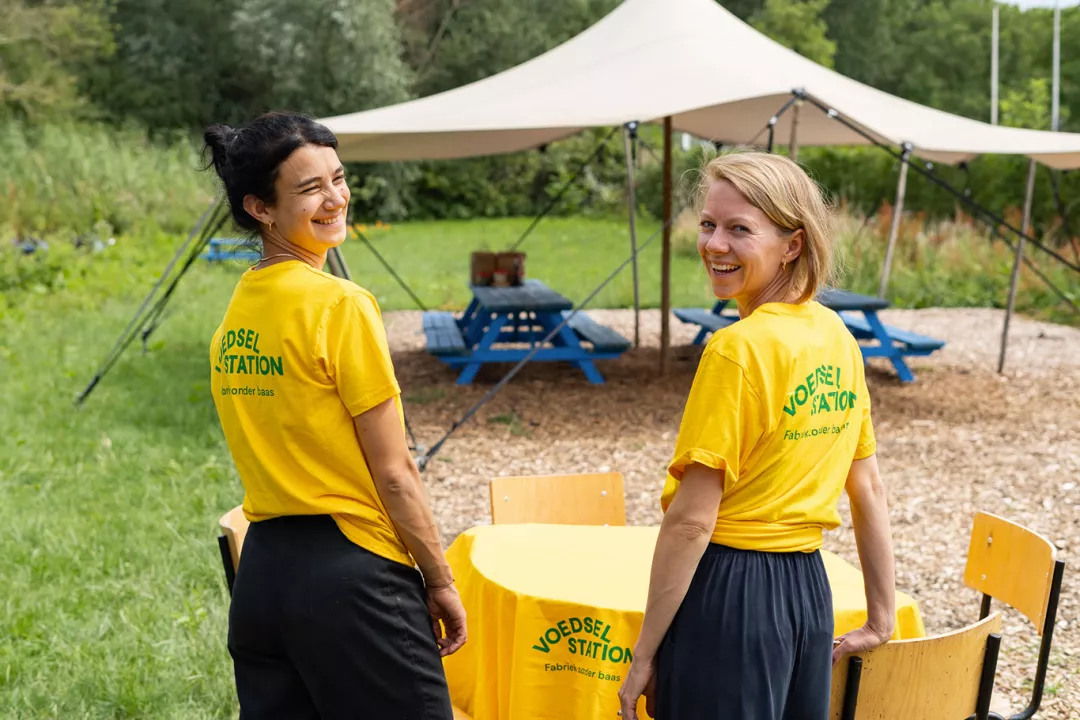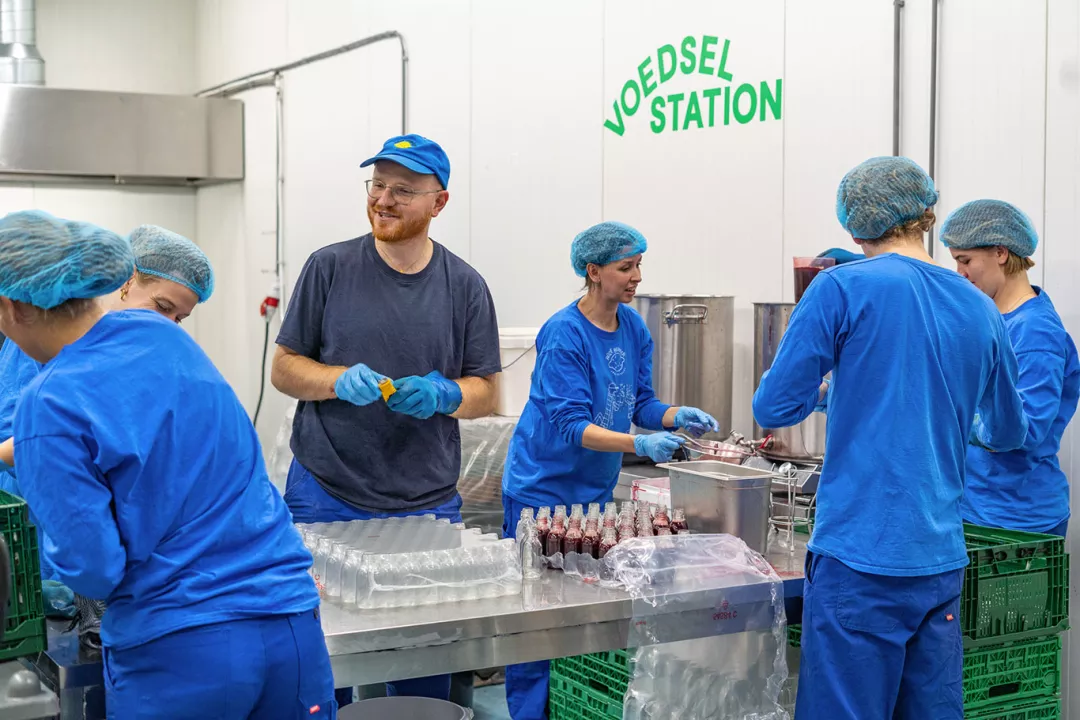General information
RDP Priority
- P6. Social inclusion and local development
RDP Focus Area
- 6B: Local development
RDP Measure
- M19: LEADER/CLLD
Beneficiary type
- Producer group / cooperative / farmer’s association
Summary
Two young food companies with a mission – De Fruitmotor and Roze Bunker – moved in 2021 into a former furniture factory in Culemborg, and the idea to start the 'Food Station' in the factory and surrounding land was born. The Food Station is a cooperative currently with ten members/producers, expected to grow to 20–25 in the coming years. They are all focused on making, processing and innovating around fruit-based products and aim to make the food system more sustainable through short regional and circular value chain concepts.
The Food Station plays an important role as a learning-work factory for fruit growers and other regional stakeholders via training programmes. It is an important partner and hub for educational activities on food system innovation and food processing. The growers and farmers meet and work together with innovative food makers, residents and customers in the region.
This project contributed to the realisation of and investments in the development of 'The future fruit entrepreneur' living lab, where 22 participants took part in two courses of five to six days. Two series of 'Fruit Innovation Labs' were carried out with around 80 participants.
Results
- Courses/training sessions/living labs have broadened the horizons of 100+ young people (most under 35–40).
- Visits to the Food Station have increased, including from the mayor and aldermen of Culemborg, who welcomed the livelihood and attraction to young people that the project brings, and also announced that a new neighbourhood around Food Station would be developed.
- Entrepreneurial food networks with similar missions are interested in collaboration to understand the Food Station model.
- The municipality of West Betuwe (a major fruit cultivation area in the Netherlands) invited Fruitmotor to embed the 'Future Fruit Entrepreneur' course in the municipality’s policies to support fruit farmers in making the transition to sustainable, nature-inclusive business models. By the end of 2024, Fruitmotor will help 20 fruit farmers develop and validate future business models to create supporting policies and infrastructures at the municipal and regional levels.
- Food Station has a natural appeal to young people – no problem finding driven new talents to join the mission.

Promoter
Voedselstation BV
Funding
Total budget: 158 500 (EUR)
EAFRD: 66 701 (EUR)
National/Regional: 66 700 (EUR)
Private/Own funds: 25 099 (EUR)
Context

The Food Station is situated in Culemborg in the fruit region of the Betuwe. While the fruit sector is one of the most important economic pillars of the region, its future is in the balance. Around half the fruit growers struggle to make a viable living, with supermarkets and wholesalers dictating price levels of fruit in the market. In the chain, fruit growers run the biggest risks (including due to climate change) while making the lowest margins. It is the opposite for wholesalers and supermarkets. Also, many older fruit growers do not manage to find a successor when they retire. Young talents leave the region for (higher) education and often do not return after graduation due to the lack of perspectives for an interesting, viable and sustainable living as a fruit grower.
At the same time, EU and regional policies are furthering the transitioning toward forms of nature-inclusive farming. This is making fruit growers feel trapped, as they have neither the mental nor the financial room for this very necessary change.
The Food Station strives to be part of a solution to create an attractive future for young talents with an interest in fruit growing and food more generally.
The Food Station contributes to transitioning to sustainable food systems and business models by offering living labs and courses that further entrepreneurship, the development of sustainable business models and collaboration between young food makers, fruit growers, and farmers as part of the transition towards nature-based farming.
Objectives
The aim of the project is to retain young talents in the region with an interest in becoming sustainable farmers, fruit growers or food makers, via its two courses and living labs.
The project also looks to provide an opportunity for young talent, farmers and entrepreneurs to start their own food company or collaborate with food makers within the Food Station. This can be done in the cooperative production facility, where products made of fruit and vegetables can be processed into drinks (e.g. squashes, ciders, fruit wines and liqueurs) or solid food (e.g. tempeh made from Dutch beans, which simultaneously restores fertility and biodiversity to the soil). There is also a shared office (where ideas and collaborations start with coffee and chats between young entrepreneurs) and on the land outside where farmers, food makers, neighbours and other stakeholders meet for events such as markets and pop-up dinners.
Activities
CAP funds were used to develop and conduct the courses and living labs.
The first was 'The future fruit entrepreneur'. Predominantly, fruit growers were involved in a learning journey of five to six days to develop their own sustainable business model (in the context of a transition towards nature-inclusive agriculture). There were 22 participants in total in June/July 2023 and September/October 2024.

Around the same time, 'The fruit innovation lab' was held. In total, 80 people – including young people under 35, food entrepreneurs, farmers and others interested in contributing to a more sustainable food system – participated. The course ran from autumn 2023 until summer 2024.
The project also encouraged the development of the cooperative production facility, where food makers pay a monthly fee to collectively share machinery and equipment to develop new food products (to a scale of 1 000 litres or kilogrammes per batch) or to produce them in an artisanal way (batches of 3 000-5 000 litres or kilogrammes).
Many of the activities carried out within the scope of the project were individual. Betuwe’s Bakkie was created when a coffee maker in the Food Station realised that obtaining fair raw coffee beans was difficult due to a lack of transparency and fairness in the coffee chain, which often meant that coffee farmers received prices that were too low. They resolved to pay farmers a fair price, use responsibly grown beans, roast traditionally and donate 5% of the profit to social causes.
DeGrow Lab produces artisanal kombucha with a positive sustainable impact, raising awareness about short chains and with a commitment to circular practices, such as sourcing orange peels without having to use fresh oranges.
Roze Bunker uses surplus fruit and fresh herbs to make squashes. By not adding water before transport, they reduce transport volume and plastic use in the soft drink industry. They are actively promoting biodiversity, reducing food waste and shortening the food chain by seeing soft drinks as a solution for sustainability.
Main results
Both courses/training sessions/living labs have broadened the horizons of over 100 young people (most of them under 35–40) with regard to their mindset and skillset to create sustainable business models aimed at restoring food systems, biodiversity and the planet, and making agriculture more regenerative. The business models typically have a triple orientation of people, planet and profit.
Visits to the Food Station have increased, including from the mayor and aldermen of Culemborg, who welcomed the livelihood and attraction for young people that the project brings in and also announced that a new neighbourhood around the Food Station would be developed.
Entrepreneurial food networks with similar missions are interested in collaborating to understand the Food Station model, while the municipality of West Betuwe (a major fruit-cultivation area in the Netherlands) has invited the Fruitmotor to embed the 'Future Fruit Entrepreneur' course in the municipality’s policies to support fruit farmers to make the transition to sustainable nature-inclusive business models. At the end of 2024, Fruitmotor will help 20 fruit farmers to develop and validate their future business model in the context of creating supporting policies and infrastructures at municipal and regional level. It is the intention that the course, training sessions, and living lab become a permanent part of the municipality's supporting policies for farmers.
Food Station also has a natural appeal to young people, and thus far, there has been no problem finding driven new talent who want to join the mission.
Key lessons
By creating and being a meeting place, the Food Station makes complex topics (such as transitions of food systems) approachable and invites different stakeholders to work together. Food Station members walk the talk and lead by example.
The Food Station's influence varies from small actions, products, and events to impact at the system level on biodiversity, the landscape, agriculture, and food. Over time, those involved are learning better how to connect the dots, tell the story and make more impact.
If a project is innovative – and successful – members will be invited to talk about it, and the initiative will be seen as an example. This is the case with the Food Station and the hope is that it will result in more people undertaking similar activities.
Michiel Kortstee

